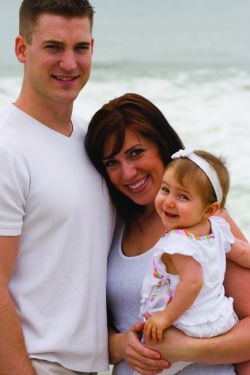
Advice on Parenthood

As your pregnancy progresses, it is likely that you will be thinking more about what your baby will be like when he or she arrives. It is perfectly natural for parents to focus on their child's development but it is important to remember that every child is an individual who will progress at their own rate. However, we have provided some general information about child development below:
Milestones in your child's first year
0-3 months: Your baby will learn to lift their head while lying on their front; they will be startled by sudden, loud noises; by two weeks, your baby will be able to recognise its parents; by four to six weeks it may start to smile and by six weeks, will be able to follow the movement of a brightly coloured toy held about 20cm away. During this time, your baby will begin to experiment with making different noises.
3-6 months: Your baby will begin to reach out for objects and later, hold and suck an object, although learning to let go does not come until a few months later; their noises will become more repetitive and varied; by six months, your baby will be able to see across a room.
6-9 months: During this time, your baby will learn to sit unsupported and will start trying to crawl - some babies crawl forwards, others backwards or by shuffling on their bottom; some children learn to walk without crawling at all. Your child will begin to pull themselves upright and stand by holding on to the furniture; they learn to pass objects from hand to hand and, by seven months, will turn to the sound of your voice or quiet noises. From about eight months onwards, they may also respond to their own name and begin to say 'mama' or 'dada' to their parents.
9-12 months: From about nine months, your baby will learn to let go of an object; from ten months onwards, they may walk alone (although some children walk as late as 18 months) and from 11 months, they may be able to feed themselves finger foods.

Feeding your baby
Healthcare professional advice for new mothers is that 'breast is best'. The Department of Health recommendations follow those of the World Health Organisation which advises breast milk exclusively for at least the first 6 months of the baby's growth. If you have any concerns talk them through with your midwife and health visitor whose priority is that you and your baby are healthy and thriving. Don't be worried about asking for advice; as well as your immediate health care professional contacts, there are a number of excellent support services available.
These include the Breastfeeding Network and the La Leche League; your hospital may have its own breastfeeding counsellor. You can also call the National Breastfeeding helpline: 0300 100 0212 or visit www.nhs.uk/start4life. Start4Life has a helpful leaflet outlining the 6 building blocks based on the latest infant health research.
Benefits of breastfeeding
The benefits of breastfeeding to ensure your baby's best start can be summarised as follows:
- Your milk provides all the nutrients your baby needs
- It helps to protect your baby from infection and other diseases
- Breastfeeding helps you and your baby bond, physically and emotionally.
Breastfeeding also has added benefits for you:
- Can lower your risk of developing breast and ovarian cancer
- Uses up about 500 calories a day leading to easier pregnancy weight loss
- Saves money - formula can cost as much as £45 per month.
Not breastfeeding your baby can increase the risk of it suffering from:
- Diarrhoea and vomiting leading to hospital visits
- Chest infections
- Ear infections
- Being fussy about new foods
- Being constipated
- Being obese leading to possible type 2 diabetes
- Developing eczema
Weaning your baby
Generally most babies are ready to start solids by the age of six months. If you have any concerns about this or if your baby was premature, it is best to ask your GP or health visitor about when it is appropriate to introduce solids.
New parents often worry about how they will know when it is the right time to start introducing solids. As a rough guide, it's worth looking out for the following signs:
- Your baby can hold their head up, maintaining a steady, upright position in order to take first foods from a spoon;
- Your little one sits well when supported in a highchair;
- Your son or daughter makes chewing motions and starts to display a curiosity in what you are eating, watching you eat and reaching for your food;
- They have gained weight steadily and are approximately double their birth weight.
Baby rice and pureed fruits or root vegetables make ideal first foods. You should let your child take the lead as they may only want a teaspoon or two of food to start off with (remember, they have tiny stomachs and have been used to a liquid diet before now). Gradually increase solid foods between six and twelve months so that they become the main part of your baby's diet; you should still give breast milk or formula alongside these solids. Your health visitor will give you information on weaning and a number of good books on this subject are currently available.
The World Health Organisation recommends extended breastfeeding for the first two years of a child's life. By the time your little one reaches their first birthday, they should be eating three meals a day as well as two nutritious snacks to keep up their energy levels. In fact, many children of this age prefer to 'graze' throughout the day as they concentrate their energies on their newfound mobility!
Baby-led Weaning
An increasing number of parents are choosing to forgo purees and spoons and allow their babies to feed themselves finger foods from the outset - this is known as Baby-led Weaning or BLW. Weaning a baby on purees came about in the 1960s when parents typically started giving their children solids as early as three or four months old, when a child is generally unable to sit , grasp or move food to the back of its mouth.
Over recent years, the UK government has changed its advice about weaning to fall in with the World Health Organisation, which recommends exclusive breastfeeding for the first six months before then introducing solids.
At six months old, a baby is usually able to sit well in a highchair, support its own head, grasp a spoon or finger foods, move them to its mouth and use its tongue to move food to the back of its mouth in order to swallow. The theory behind baby-led weaning is that the child will only take into its mouth what it wants because it has control, which means that the risk of choking is minimal, although, of course, no child should ever be left to eat unattended. Baby-led weaning means that children do not have to make the often difficult transition from smooth food to lumps, and they become very comfortable with food textures because they are used to handling food from their earliest experiences of eating solids.
Foods that lend themselves to baby led weaning include broccoli and cauliflower florets, pita bread, cooked carrots, peas, sweetcorn, courgettes, banana, strawberries, blueberries, cheese and many others. Of course, some foods are not suitable finger foods, so many Parents choose to make up pureed dinners but give their child fingers of cooked vegetables or bread, for example, to dip into the puree and feed themselves (see www.babyleadweaning.com for more information).
Food Allergies
Evidence suggests that waiting until six months to introduce solid foods into your baby's diet will help minimise the risk of them developing allergies and adverse reactions to foods. This is particularly important if you have a family history of allergies, as the incidence of adverse food reactions, allergies and coeliac disease does decrease if you delay weaning until this time.
Some foods - for example, wheat or cow's milk - are difficult for some children to digest. Food intolerance or allergies can cause sickness, diarrhoea, eczema, coughs or wheezing but are usually outgrown in early childhood. If you suspect your child is reacting to a food, always speak to your GP or health visitor immediately. Do not experiment with cutting out a specific food, such as milk, without the guidance of a qualified dietician.
If your child is diagnosed with an allergy or intolerance, you will be given advice about modifying their diet and there are now many good, healthy alternatives to milk and wheat, for example. You may also wish to seek more information from Allergy UK on 01322 619 898 or visit their website at www.allergyuk.org.
Potty And Toilet Training
The time at which children gain bladder and bowel control varies enormously, so try not to worry or compare your child with others. It is usual for your child to be able to control their bowels before their bladder. As a rough guideline, at the age of two, one in two children are dry during the daytime; by the age of three, nine out of ten children are dry most days but even then the odd accident is inevitable if your child is upset or distracted by an absorbing activity.
Learning to stay dry throughout the night usually takes a child longer than staying dry during the day. This is because a full bladder at night demands one of two responses, waking up and going to the toilet or waking up and holding it in until morning. However, night time dryness is usually learnt between the ages of three and five.
Further information:
Childcare Advice
Employment, Finances & Benefits
Health & Lifestyle
Illness, First Aid & Immunisations
Parenthood Advice
Postnatal Depression
Pregnancy Advice
Relationship Difficulties
Useful Contacts
